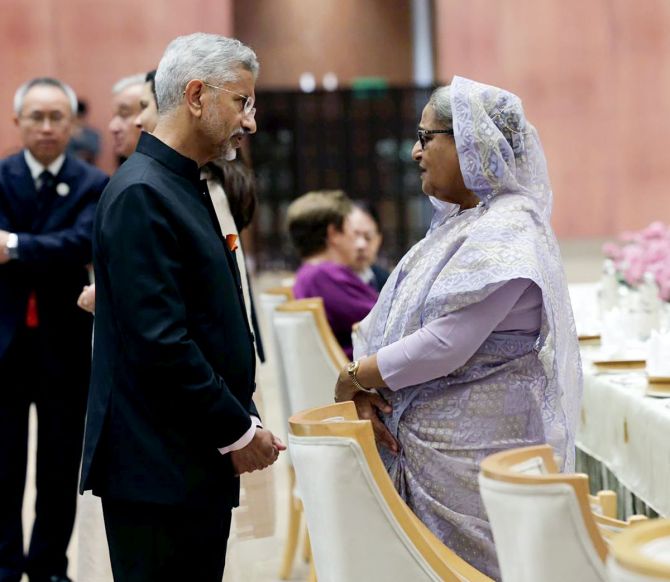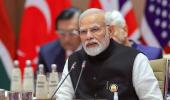'You know the kind of force involved in all of this. They are not good for the country where all of this will happen.'

I came to know about External Affairs Minister Jaishankar's visit to Thiruvananthapuram only two days before he arrived. So I did not have much hope when I contacted him to request an interview.
I was delighted when his office asked for a suitable time.
When I thanked him for agreeing to the interview, he charmingly said he could not have said no to me.
He was referring to the fact that I had worked with him, his father K Subrahmanyam and then his son Dhruv Jaishankar at the Brookings Institution in Washington, DC.
The buzz even when he came to Thiruvananthapuram a few months ago was that he could be the BJP candidate from the Lok Sabha constituency in 2024.
The Asianet news team repeatedly asked me to ask him about his plans for the next election.
Though I told them that he would not say anything unless a decision was formally taken, I referred to his two visits to Kerala and asked whether it carried a political message.
The EAM smiled and said he liked Kerala very much and welcomed every opportunity to come here.
He added that he had good friends here like me who mentored him for a long time, giving a hint of a possibility of his being considered for Thiruvananthapuram.
My first question was about the way India took the responsibility as the president of the G20 a year ago, set its agenda and held more than a hundred meetings in 60 cities and played a leading role at the Summit last fortnight.
The EAM said that India took diplomacy out of the conference halls and took it to the people and also showcased India to the world.
When I said India had actually reformed multilateralism in effect and created a new model for the world, he observed that my observation was insightful.
Speaking of the emerging new world, the EAM said that the West was not the "bad guy" as it was not flooding Asian and African markets with goods on a massive scale and that there was a need to get over the "syndrome" of seeing it in a negative way.
He also made it clear that he was not batting for the West.
"It is not the West which is flooding Asia and Africa with goods on a massive scale. I think we need to get over the syndrome of the past that the West is the bad guy and on the other side are the developing countries. The world is more complicated, the problems are much more complicated than that," he said.
On being asked whether Chinese President Xi Jinping did not attend the G20 Summit in New Delhi because China did not want to be seen as accepting India as a leader of the Global South, the EAM said the reasons were up for speculation.
The issue today, he said, was the building up of a strong sense of the inequities of globalisation where countries saw their products, manufacturing and employment come under stress due to their markets being flooded by cheap goods -- an indirect reference to Chinese trade and economic policies.
This underlying resentment and pain of those countries regarding the global economy was building up for the last 15-20 years, the EAM noted, and the COVID-19 pandemic and the Ukraine conflict had resulted in prices of energy and food items going up.
So there was a sense of anger building up in countries about them being used as an extractive resource to fuel the economy of another nation and added that the West was not to be blamed for that.
He made it clear that in today's globalisation there was a concentration of manufacturing that was being leveraged and subsidised and was affecting economies of various nations.
However, India's manufacturing, agriculture, scientific achievement like the Chandrayaan-3 mission, ability to vaccinate, etc all of that has created a sense among the Global South, which includes the African Union, "that one of us has the ability to stand, grow and progress. So they identify with us in a way that they do not with other people."

Responding to my questions, he also spoke about the achievements of the G20 Summit under the Indian presidency and the threat posed by the political space given by Canada to the Khalistan group.
The EAM said some of the major achievements of the G20 Summit under the Indian presidency was that India was able to get the influential group of nations back on the track of growth and development and also focus on the Global South initiative.
In addition to that, the country was also able to do diplomacy in a different way and through the summit created a greater interest in the nation about the world.
India, he said, was a different country now with a different level of confidence and a different leadership and the manner in which the G20 was conducted has only benefited the nation.
The summit, the EAM observed, showed that the agenda "does not have to be decided by the West or by the P5 or by a narrow one or two countries" and that India too can shape it.
"By giving a voice of the Global South and bringing 125 nations together, we straightaway shaped the agenda," he said.
At the same time, he said, the Global South was not a new world order or a definition and India was not claiming to be its leader.
"My most truthful answer is that the Global South is not a definition, but a feeling. It is a feeling of solidarity, a willingness to put yourself out," he said, adding that "those who are part of it know it and those who are not also know it".

World leaders at the two-day G20 Summit in New Delhi recently had hailed Prime Minister Narendra Modi for his 'decisive leadership' and for championing the voice of the Global South.
The EAM welcomed the proposed economic corridor with India at one end and Europe at the other and which passes through the Middle East making it easier for people from here to go there for job opportunities.
While speaking about people migrating abroad for jobs, he touched upon the issue of the Khalistan group's activities in Canada and its effect on India's relations with that country.
He said the problem arises when, for whatever reason, such countries give space in their politics for activities of such groups.
There were compulsions in politics, the EAM said, "but everybody, especially in a democracy, must temper that with a larger sense of responsibility to the world as well as a sense of responsibility to their own image and their own well being."
"Forget us for the moment. You know the kind of force involved in all of this. They are not good for the country where all of this will happen. Today it is Canada, it could be something else tomorrow. We are focusing on generating that appreciation," he said.

When I asked how India managed to not get Russia blamed for the Ukraine conflict in the G20 declaration, the EAM said, "Everybody compromised."
"There was a lot of give and take," he added.
What happened at last year's G20 Summit in Bali, where Russia was blamed, he said, could not be repeated in India and at the same time the clock could not be stopped there.
"This is New Delhi. So the New Delhi outcome had to be forged," he said.
At the G20, he said India was able to focus on the Global South in terms of phrases, agenda, outcome and the African Union's membership "for which Prime Minister Narendra Modi really stuck his neck out".
"This is a different country, with a different level of confidence and a different leadership," he said.

I questioned the EAM about the complications which are likely to arise on account of Russia and China being a part of the Global South.
The solidarity of the Global South might be in question and China might want to claim the leadership of the Global South, which might become an additional irritant in India- China relations.
His point was that this was an early stage and many countries other than the big powers will develop clout in it.
India, he asserted, had consulted 125 countries, who had pledged support to the concept.
Finally, I said that New Delhi has provided two important bricks to the emerging global order by strengthening ties with the US and by conceptualising and elaborating on the Global South.
Many more bricks were needed to build the new global order.
"They will come," he optimistically replied.
I complimented him for emerging as the authentic voice of India and for interpreting PM Modi's vision and for explaining the rationale of foreign policy the Indian way.
Ambassador T P Sreenivasan is a frequent contributor to Rediff.com.
You can read his earlier columns here.
Feature Presentation: Aslam Hunani/Rediff.com











 © 2025
© 2025